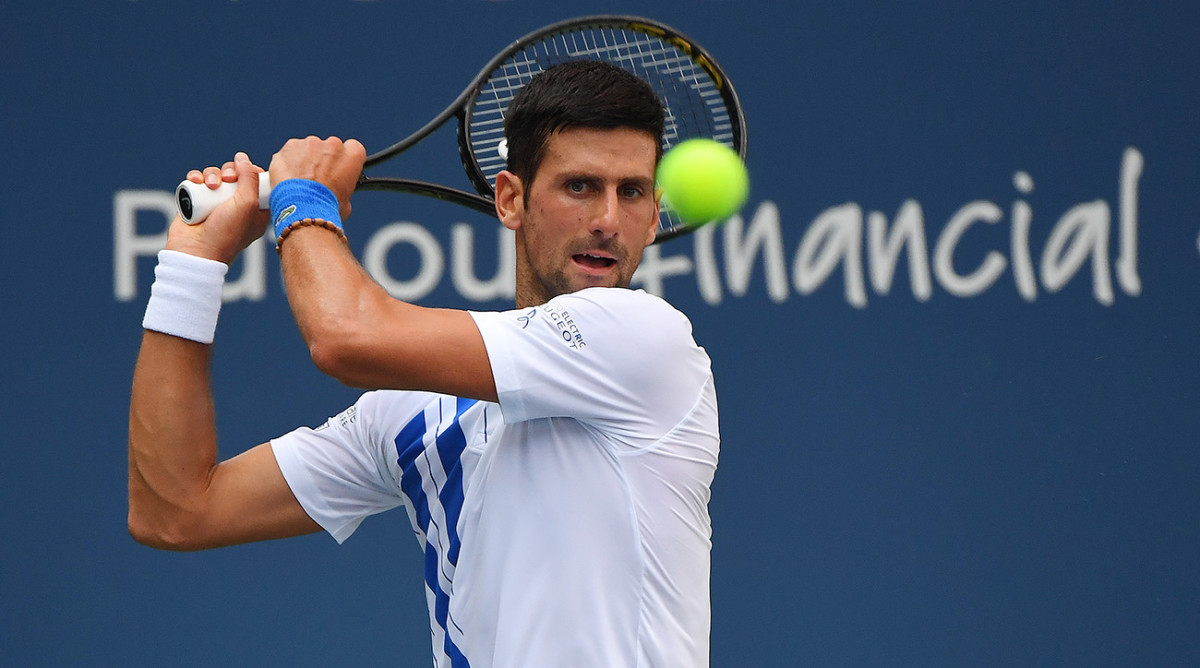Novak Djokovic Held at Australian Airport Due to Visa Issue


BRISBANE, Australia (AP) — With so much focus on getting the medical exemption he needed to fly into Melbourne to defend his Australian Open title, it seems Novak Djokovic may not have paid enough to attention to his visa.
The medical exemption allowed the top-ranked Djokovic entry to the tournament regardless of his vaccination status for COVID-19, a subject he has declined to clarify amid months of speculation he could miss the season-opening major unless he can prove he’s had two doses of a coronavirus vaccine.
But it wasn’t everything he needed to enter Australia, which has strict border regulations in place for the pandemic.
Melbourne’s The Age newspaper reported that Djokovic had landed Wednesday before midnight local time at Tullamarine Airport, but his entry was delayed because of a mistake with his visa application. Two hours later, local media reported he still hadn’t cleared the border.
Speculation of a possible issue with the visa emerged while Djokovic was in transit and escalated with mixed messages from federal and state lawmakers.
Djokovic’s revelation on social media that he was heading to Australia seeking a record 21st major title sparked some debate and plenty of headlines on Wednesday, with critics questioning what grounds the nine-time Australian Open champion could have for the exemption and backers defending his right to privacy and freedom of choice.
Australian Open tournament director Craig Tiley defended the “completely legitimate application and process” and insisted there was no special treatment for Djokovic.
The Victoria state government-mandated that only fully vaccinated players, staff, fans and officials could enter Melbourne Park when the tournament starts on Jan. 17.
Only 26 people connected with the tournament applied for a medical exemption and, Tiley said, only a “handful” — estimated at about five — were granted.
The names, ages and nationalities of applicants were redacted for privacy reasons before each application for a vaccine exemption was assessed by two independent panels of experts, and Tiley noted Djokovic is under no obligation to reveal his reason for seeking one.
But, he suggested, it would be “helpful” if Djokovic chose to explain it to a Melbourne public still getting over months of lockdowns and severe travel restrictions imposed at the height of the pandemic.
“I would encourage him to talk to the community about it,” Tiley said. “We have been through a very tough period over the last two years.”
Among the reasons allowed for those applying for a vaccination exemption can include acute major medical conditions, serious adverse reaction to a previous dose of a COVID-19 vaccine, or evidence of a COVID-19 infection within the previous six months.
Jaala Pulford, Victoria state’s acting minister for sports, acknowledged in the Djokovic case that lots of people in the community “will find this to be a disappointing outcome,” but added: “Nobody has had special treatment. The process is incredibly robust.”
Concerns about Djokovic’s visa status took a while to circulate.
Australian Prime Minister Scott Morrison initially said the medical exemption decision was a matter for the government of Victoria, where Melbourne is the state capital.
“They have provided [Djokovic] with an exemption to come to Australia, and so we then act in accordance with that,” Morrison said. “States provide exemptions for people to enter on those basis, and that’s been happening for the last two years.”
Home Affairs Minister Karen Andrews then clarified in a statement that the Australian Border Force would make the final determination.
“While the Victorian government and Tennis Australia may permit a non-vaccinated player to compete in the Australian Open, it is the Commonwealth government that will enforce our requirements at the Australian border,” Andrews said. “If an arriving individual is not vaccinated, they must provide acceptable proof that they cannot be vaccinated for medical reasons to be able to access the same travel arrangement as fully vaccinated travelers.”
When asked again about Djokovic’s case, Morrison added: “If that evidence is insufficient, then he won’t be treated any different to anyone else and he’ll be on the next plane home.”
“And so if medical exemptions had been provided by medical professionals and that’s been furnished to him as a proviso for him to get on that plane, well, that will have to stack up when he arrives in Australia,” the Prime Minister said.
Later still, Pulford, the Victoria state politician, posted on Twitter to say “the federal government has asked if we will support Novak Djokovic’s application to enter Australia.”
She said the state government would not be providing individual application support, adding in a second post: “We’ve always been clear on two points: visa approvals are a matter for the Federal Government, and medical exemptions are a matter for doctors.”
Djokovic tested positive for the coronavirus in 2020 after he played in a series of exhibition matches that he organized in Serbia and Croatia without social distancing amid the pandemic.
It’s not inconceivable that the 34-year-old Djokovic, who finished one win short of a calendar-year Grand Slam in 2021 when he lost the U.S. Open final to Daniil Medvedev, could have been infected again.
The decision on whether to elaborate now is in Djokovic’s court.
More Tennis Coverage:
